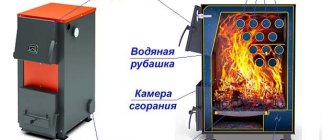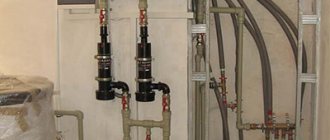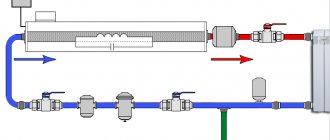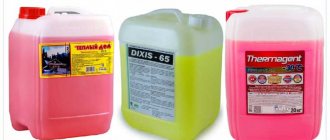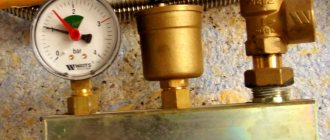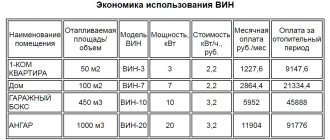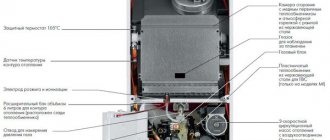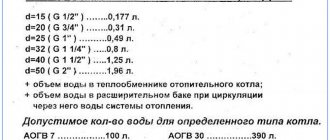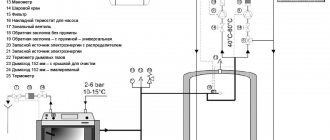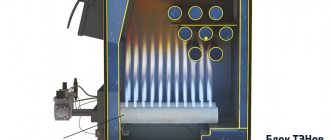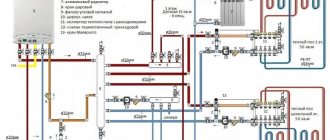Fill it up and use it?
It would seem that if there is a problem - the risk of water freezing in the heating system - there is no need to hesitate, you need to fill in antifreeze. Indeed, in our conditions, power outages for a long time are commonplace, and without warning. This means that in winter serious problems can arise in private homes. But there is another difficulty. Many manufacturers of heating boilers categorically do not recommend the use of antifreeze in systems in which their devices are involved. A reasonable question arises: why?
Antifreeze into the system. Double-circuit wall-mounted boiler.
Installation, installation, operation of all types of gas boilers.
Answer
Posts: 7 • Page 1 of 1
Antifreeze into the system. Double-circuit wall-mounted boiler.
Guest » 05 Aug 2012, 23:41
Greetings, whoever is here.
It’s a tricky question, I asked at the boiler store, but they didn’t give me a concrete answer. Is it possible to use a gas wall-mounted boiler, I have a Viessmann, with antifreeze in the system? Guest
Return to top
Antifreeze into the system. Double-circuit wall-mounted boiler.
Serg_i_K » 05 Aug 2012, 23:57
A very capacious question. According to the recommendation on the Viessmann website, you can only use special liquids produced, naturally, by Viessmann. However, not everything is so sad. The general recommendations are as follows: it should be a good quality liquid intended for pouring into heating systems, and not antifreeze or antifreeze from the car market. Second: boilers are designed to work with water, filling this liquid changes the entire hydraulics of the system, reduces heat transfer, and creates problems for the pump. Therefore, I recommend diluting the liquid with water exactly in the proportion as indicated in the instructions, i.e. if up to minus 20 degrees the concentration is 1:1, then dilute it and do not add 100% of the liquid. The principle of “more is better” does not work here. And if you are just going to install the system and plan to use anti-freeze, then it is better to use pipes with a diameter one size larger than for a water system (for example, 32 instead of 25, etc.).
Construction materials, tools, full set, equipment, delivery - Luninets, district, tel. Velcom (029) 6484008, MTS (033) 6806008, Personal Message.
Serg_i_K
Messages: 575 Registered: July 29, 2012, 17:48 From: Gomel, Luninets
Return to top
Antifreeze into the system. Double-circuit wall-mounted boiler.
Sergey N » 25 Nov 2012, 21:24
Everything in the operating instructions is written there, what can be poured into it and what cannot. It is best, of course, to use water regularly, as everyone else does. But if you are all so afraid of freezing in winter, you need to read what anti-freeze can be poured into it and use only such compositions. There is no amateur activity allowed here, everything is strictly according to the instructions.
The most economical gas heaters + reviews - https://www.optcentre.ru/topic/3185-otzy ... #entry4007
Sergey N
Messages: 2684 Registered: March 11, 2012, 23:18 From: Kazan
Return to top
Antifreeze into the system. Double-circuit wall-mounted boiler.
T ima » 28 Feb 2014, 17:14
Please tell me how you can pour liquid into a double-circuit boiler, because it has one water supply for two circuits!?!?!
If you pour liquid into the heating system, won’t it mix with regular water, there’s only one supply?!?! T ima
Return to top
Antifreeze into the system. Double-circuit wall-mounted boiler.
Igor_01 » June 05, 2014, 17:31
T ima wrote: Please tell me how you can pour liquid into a double-circuit boiler, because it has one water supply for two circuits!?!?! If you pour liquid into the heating system, won’t it mix with regular water, there’s only one supply?!?!
Hmm, it shouldn't be like that!
That's why it's dual-circuit! Look for a valve there - a faucet or something like that, it must be there! Double-circuit boilers would not be called that if there were no complete separation. Essentially, this is a gas water heater and a boiler combined in one building! I only dealt with such a device once, so I didn’t have time to properly understand it and learn all the intricacies of its operation, sorry.. Climate equipment supply network - https://www.optcentre.ru/topic/1842-nuzh … ht /?p=2605 — https://www.optcentre.ru/
Igor_01
Posts: 2010 Registered: Apr 13, 2012, 12:23 PM
Return to top
Antifreeze into the system. Double-circuit wall-mounted boiler.
Anatoly » June 08, 2014, 13:03
Guest wrote: Greetings, whoever is here. It’s a tricky question, I asked at the boiler store, but they didn’t give me a concrete answer. Is it possible to use a gas wall-mounted boiler, I have a Viessmann, with antifreeze in the system?
It is possible... but it is necessary to take into account a lot of BUT... First and foremost, it is necessary to increase the number of radiators by 20 - 30%. The second is that the expansion barrel also needs to be changed, increasing its volume by 15 -20%. Thirdly, you should not thoughtlessly lower the freezing point of antifreeze. Fourthly, the antifreeze in the system should be completely changed once every five years. Fifthly, if necessary, only distillate should be added to the heating system. During the operation of such systems, additional questions may arise... These features of the use of antifreeze, and a special one, are also typical for other heating systems using single-circuit boilers... Anatoly Messages: 1707 Registered: Apr 03, 2013, 01:23
Return to top
Antifreeze into the system. Double-circuit wall-mounted boiler.
Bibikin Ivan » Sep 11, 2014, 11:30
Fourthly, the antifreeze in the system should be completely changed once every five years. I didn’t know this topic, to be honest! This means that antifreeze does not last forever! It’s interesting what happens to it over the years, it seems like it shouldn’t age, it’s not motor oil. And interestingly, replacement depends on the type of pipes in the system. Well, for example, metal ones - replacement once every 5 years! Plastic - once every 10 years, etc. Who would clarify this important issue?
The topic was raised by Anonymous on Sep 11, 2014 at 11:30 am.
We are moving to live on a desert island! With us?! — https://www.neobitaemyi.ru/
Bibikin Ivan
Messages: 1662 Registered: May 16, 2012, 14:10 From: Moscow
Return to top
Answer
Posts: 7 • Page 1 of 1
Return to Gas boilers and burners
Who's at the conference now?
Registered users: no registered users
Switch to mobile style
Reasons why boiler manufacturers refuse to use antifreeze
(Slovakia) declares that it is not responsible for the consequences caused by the use of antifreeze. Cast iron boilers manufactured by the company are not designed to interact with non-freezing liquids. Vaillant (Germany) is even more categorical, declaring that non-freezing liquids cannot be used in wall-mounted boilers! As for other manufacturers, everything is more confusing here. Some of them inform about the use of special paronite gaskets in the design of boilers, which are suitable for many types of antifreeze. However, the other side of the coin is not advertised: difficulties with seals are not the only problem when using antifreeze.
Advantages of Antifrogen formulations
Antifrogen L is a product based on 1,2-propylene glycol and anti-corrosion additives. It is environmentally friendly and does not contain phosphates and nitric acid salts - nitrites and amines. Used as a heating medium and cooling brine in heat pumps, solar power applications and the food industry.
This material is compatible with elastomers and plastics, its minimum permissible working concentration is 25%. In this case, the temperature range for continuous operation is from -25ºС to +150ºС.
Antifrogen N is produced on the basis of monoethylene glycol and is used in hot water supply systems, heating systems, solar systems, heat pumps and industrial refrigeration systems. It can be used with water and aqueous mixtures, with a minimum working concentration of 20%. The temperature range for continuous use is from -35ºС to +150ºС.
Selection of equipment when using Antiphrogen
It should be taken into account that when using Antifrogen compositions as an additive to the coolant, certain requirements are put forward when selecting and designing equipment:
- increasing the power of radiators and underfloor heating, since the thermal conductivity and heat capacity of antifreeze is less than that of water;
- a more powerful circulation pump, since the viscosity of the coolant is higher;
- increase in the volume of the expansion tank due to a higher coefficient of thermal expansion;
- the use of pipelines with a zinc internal coating is inadmissible due to the formation of heavy sediment upon contact with a water-glycol mixture, which can cause the system to fail.
It is also necessary to take into account that when using antifreeze as a coolant, the characteristics of the boilers may differ from those stated in the passport.
Finally
Viessmann recommends Antifrogen fluids from Clariant as they provide reliable system protection against freezing, corrosion, scale formation and rust. These compositions are inert to gasket materials and have a long service life - from 20 years or more.
By purchasing Antifrogen antifreeze, you get confidence in the long and uninterrupted operation of boilers. You can buy them at affordable prices by clicking on the appropriate button below.
What problems exist when using antifreeze fluid in heating systems?
Problem #1
Since water and antifreeze have different physical characteristics, when designing a heating system, it is necessary to take into account whether one or another liquid will be used. Basic calculations are made, of course, for water. If you plan to use antifreeze, you will need to change some system parameters:
- boiler power;
- increase the pressure of the circulation pump by 60%;
- increase the volume of the expansion tank by 50%;
- increase the thermal power of radiators by 50%.
Problem #2
Antifreezes based on ethylene glycol have one feature - they “do not like” system overheating. For example, if at any point in the system the temperature exceeds the critical temperature for a given brand of mixture, ethylene glycol and additives will decompose, resulting in the formation of solid precipitates and acids. When precipitation falls on the heating components of the boiler, carbon deposits appear, which reduces heat transfer, stimulates the appearance of new precipitation, and increases the likelihood of overheating.
The acids formed during the decomposition of ethylene glycol react with the metals of the system, as a result of which the development of corrosion processes is possible. Decomposition of additives can cause a decrease in the protective characteristics of the composition in relation to seals, which can cause leakage at the joints. If the system is zinc coated, the use of antifreeze is not permitted. When overheated, increased foaming occurs, which means that airing of the system is guaranteed. Therefore, in order to eliminate all these phenomena, it is necessary to strictly control the heating process. Since boiler manufacturers do not know the physical properties of the coolants used (except water), they exclude their use.
Problems #3
Antifreezes have increased fluidity. Consequently, an increase in the number of connecting points and elements entails an increase in the likelihood of leaks. Moreover, this problem mainly appears when the system has cooled down, when the heating is turned off. When cooled, the volume of metal compounds decreases, microchannels appear, through which the composition oozes. It is therefore important that all system connections are accessible. Given the toxicity of antifreeze, they cannot be used to heat water in hot water systems. Otherwise, the mixture may get into hot water distribution points, which will pose a danger to residents.
What antifreeze should I pour into a gas boiler?
What antifreeze should I pour into the boiler? What is possible and what is not.
1 question. Is it possible to pour car antifreeze?
Answer. In gas boilers, you need to use a special antifreeze, which is indicated in the passport or universal. In addition, automobile antifreezes use substances whose fumes are harmful. There are substances and additives that, on the contrary, are missing, which can lead to the destruction of plastic, rubber and metal parts of your gas boiler. And of course, the shelf life of antifreeze is no more than three years. In turn, special boiler antifreeze has a minimum life of 10 years, plus it can simply be diluted.
2 Question. Can antifreeze be used with galvanized pipes?
Answer. No antifreeze, even the most expensive, can be used with galvanization. When interacting with galvanization, a coating in the form of white flakes will appear. Therefore, no manufacturer recommends doing this.
3 Question. Is it possible to mix antifreeze with each other?
Answer. The composition of each substance may differ in proportions or composition. Manufacturers do not recommend mixing different brands of antifreeze, even if they are the same color. If the composition does not match, sediment may occur, which may have a negative effect on all equipment. When replacing, it is recommended to drain all the old one and fill in the new one.
4 Question. What water is needed for dilution?
Answer. The best option is distilled water. But tap water with a hardness of no more than 5 mg eq. is also allowed. The main thing is not to confuse water purity and hardness. The water in wells and taps is very hard and the value can reach 20 mg or more. Otherwise, the same sediment may occur, which will have a detrimental effect on the system in the future.
At home, you can conduct an experiment by mixing antifreeze and water. If no sediment appears after a couple of days, then you can mix.
5 Question. How does antifreeze affect the heating system: boiler, radiators, pipes?
Answer. There will be no interference in the direction of chemical interaction. Properly selected antifreeze will not affect the system or material in any way. Here the question is in the correctly selected material. Because The thermal conductivity of such a liquid is 20-25% less, here you need to select radiators that are the same percentage higher. It is also worth installing a circulation pump that is 50% more powerful. The selection of pipes will not be affected without changes. The pipes should also be larger in diameter for better pumping. With this type of operation, the power of a gas boiler can be reduced by 15%, resulting in fuel savings.
6 Question. What type of expansion tank is needed for antifreeze?
Answer. As stated above, the expansion coefficient of antifreeze is greater, so we select a tank of 15% of the total volume of the heating system.
7 Question. How does undiluted antifreeze affect it? And can it be used in its pure form?
Answer. The use of pure antifreeze -65 is highly not recommended. What are the consequences? The risk is that antifreeze at this temperature has extremely low heat transfer. As a result of the gas boiler passing through the heat exchanger, the heat exchanger will overheat. In the future, such work will cause sedimentation. This sediment will begin to remain on the walls of the heat exchanger and cause carbon deposits. This deposit causes boilers to fail.
8 Question. The installer recommends diluting antifreeze to -20 degrees. No one lives in the house in winter. What happens if the temperature drops below?
Answer. The ideal consistency for a heating system is -20. With this ratio, your system is protected from chemical and temperature exposure. Even if the temperature drops below -50, absolutely nothing will happen. In this case, the antifreeze will become more viscous and resemble jelly, but there will be no freezing. As the temperature rises, the antifreeze will become liquid without losing its properties.
9 Question. How long can antifreeze be used?
Answer. The standard life of antifreeze is 5 years. After this period, all useful and operational properties are lost. Further operation is not safe, especially for a gas boiler. There are liquids that have a service life of 10 years - this is about 15-20 heating seasons.
10 Question. How to recharge a system filled with antifreeze, and how to do it correctly?
Answer. Antifreeze is a chemical substance that requires increased care and heating installation requirements. When handled correctly, it is completely safe. It is worth paying increased attention to pressing the connection to the batteries, boiler, boiler.
Replenishment should be carried out with the same antifreeze, but not with tap water. With such mixing, sedimentation occurs and heating equipment fails. Properties are also lost. Also, do not dilute more than -15. So if you have antifreeze in your system, put one canister in reserve, it won’t be superfluous.
Choosing a coolant
It is known that most manufacturers of heating boilers and equipment design their use using water as a coolant. Undoubtedly, it is a unique and often free carrier of thermal energy in heating systems.
But the issue of using antifreeze, special liquids with a low-temperature transition point to freezing, remains relevant. Despite the versatility and availability of water, its ability to increase volume when entering the solid phase leads to deformation and destruction of elements of heating systems.
What is relevant for buildings and structures such as country houses and dachas, garages, etc. Those. where there is no constant heating and there is a very high risk falling into disrepair due to defrosting of the heating system due to unexpected frosts and water not drained in time.
Diesel boiler
Diesel units are autonomous equipment that runs on diesel fuel - diesel fuel. This boiler requires electricity to operate. The diesel boiler is equipped with a fan burner, which functions so that when fuel is atomized, it mixes with air and combustion becomes more intense.
Diesel boilers from modern manufacturers have a removable burner design and the equipment can be converted to gas. To do this, install a gas burner. For a dacha, this is quite convenient, since if a gas main appears in the village, you can easily redo the system. A diesel autonomous boiler operates with a water system, during the installation of which it is better to rely on a coolant in the form of antifreeze.
But the disadvantages of this equipment include the high cost of fuel. Considering the option of heating a dacha, we can conclude that the boiler will not burn constantly, and accordingly the costs will be small. If necessary, its installation is carried out by specialists on a turnkey basis.
At dachas, radiators are more relevant, since many country houses are located far from gas sources or a boiler room.
All radiators are divided into water (they heat the room using heated water) and air (using various means of heating - liquid and solid, from electricity).
There are pros and cons to any heating system . So, for example, if you decide to heat your dacha using electric heaters, then your electricity bill will not make you happy at all. A stove heater is often used in the country. But to do this, you need to stock up on the required amount of firewood or coal and store it all somewhere else. The best option for heating a dacha is aluminum radiators with antifreeze.
